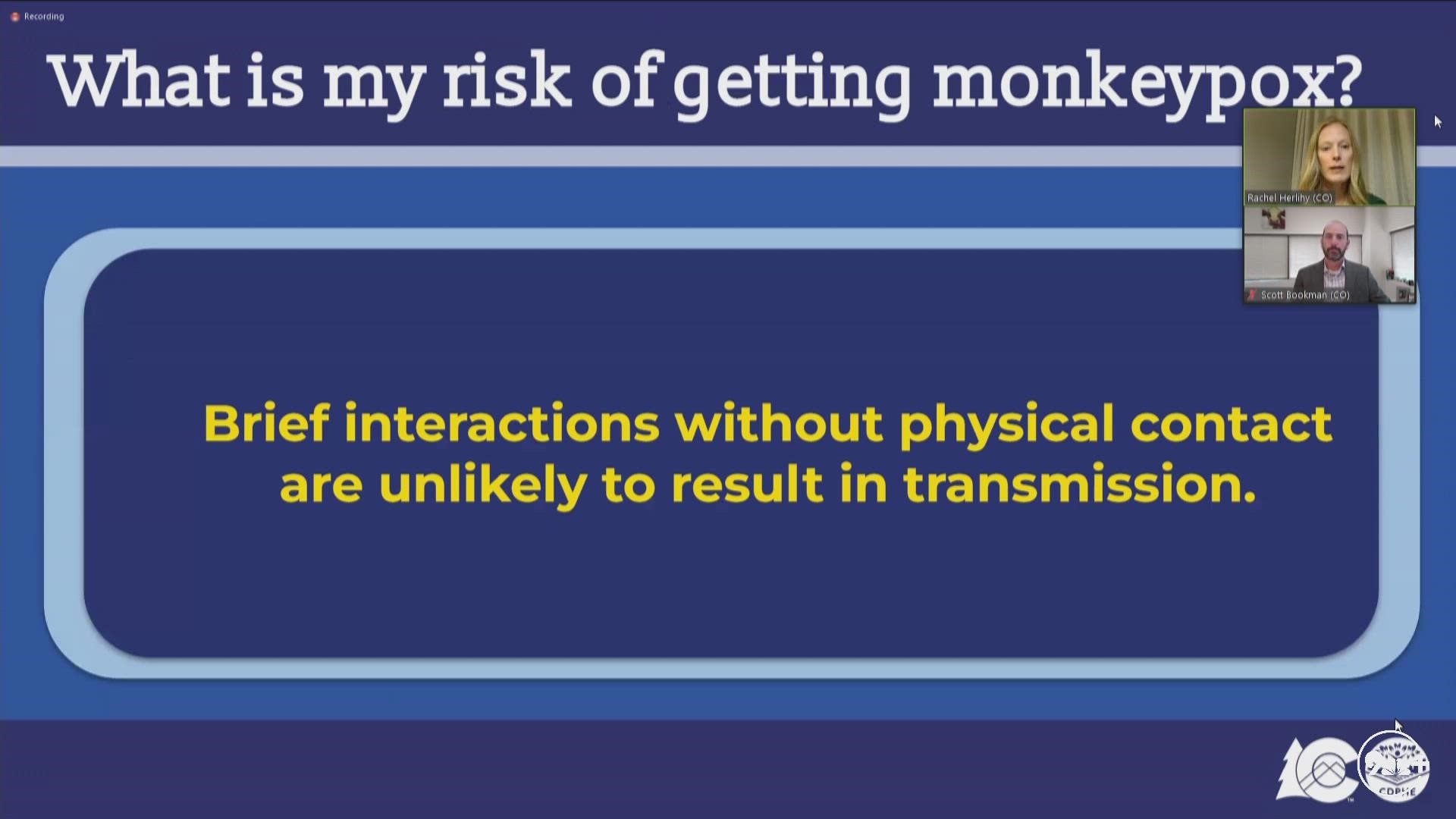DENVER — Officials with the Colorado Department of Public Health and Environment (CDPHE) said during a briefing Wednesday that five cases of monkeypox have been reported in the state but no hospitalizations or deaths, and the risk to the general public remains low.
Overall, there have been 142 cases reported in 23 states and Washington, D.C., and more than 3,000 cases in 41 non-endemic countries. That does not include countries in central and western Africa where monkeypox cases are more likely to occur.
State Epidemiologist Dr. Rachel Herlihy said the fatality rate of the version of monkeypox that is currently spreading is less than 1%. A very small percentage of cases in the U.S. have resulted in hospitalizations, and none have resulted in deaths, Herlihy said.
How monkeypox spreads
When discussing how monkeypox spreads, Herlihy stressed that brief interactions without physical contact are unlikely to result in transmission.
"Monkeypox is really not spread as easily as COVID-19 is spread from person to person," Herlihy said. "Spread of monkeypox virus depends on close contact."
Specifically, spread is caused by close contact with monkeypox rash, sores or scabs from a person with monkeypox. It can also be spread through close contact that occurs during sex.
Rashes can look like pimples or blisters and can appear on the face, inside the mouth and on other parts of the body including the following:
- Hands
- Feet
- Chest
- Genitals
- Anus
The monkeypox virus can be transmitted from the time symptoms start until all lesions have healed and new skin is formed.
People who have recently traveled to a country where monkeypox has been reported and/or men who have sex with other men are at an increased risk, according to Herlihy.
How health officials respond to monkeypox cases
CDPHE said when it identifies someone with the virus, they are asked to isolate at home and stay away from other people and pets, and remain home from work until all lesions heal and new skin forms.
Those individuals are interviewed by public health officials about travel, close contacts and medical visits. Any close contacts are monitored daily for symptoms for 21 days after their last contact with a person who has the virus. All interview information is kept confidential, CDPHE said.
Monkeypox Treatment options
Herliehy said many individuals experience a mild illness without treatment, and the virus resolves on its own. However, treatment options are available.
CDPHE has ordered a vaccination for intermediate- and high-risk health care workers and people directly exposed to monkeypox.
The vaccination may prevent monkeypox infection entirely, or make the illness milder. Vaccination is recommended within four days of exposure, but can be helpful up to 14 days after exposure.
Anyone who is concerned about a potential monkeypox exposure is advised to contact their doctor.
More information on the state's response and resources available can be found on CDPHE's website.
Dr. Rosamund Lewis, the World Health Organization’s top monkeypox expert, said last month she doesn’t expect it to turn into another pandemic, but she acknowledged there are still many unknowns about the disease, including how exactly it’s spreading and whether the suspension of mass smallpox immunization decades ago may somehow be speeding its transmission.
“At the moment, we are not concerned about a global pandemic,” she said. “We are concerned that individuals may acquire this infection through high-risk exposure if they don’t have the information they need to protect themselves.”
Monkeypox is known to spread when there is close physical contact with an infected person, their clothing or bedsheets.
Lewis said it’s unknown whether monkeypox is being transmitted by sex or just the close contact between people engaging in sexual activity and described the threat to the general population as “low.”
She warned that among the current cases, there is a higher proportion of people with lesions that are more concentrated in the genital region and sometimes nearly impossible to see.
“You may have these lesions for two to four weeks, (and) they may not be visible to others, but you may still be infectious," she said.
The Associated Press contributed to the reporting of this story.
> Top stories from 9NEWS curated daily just for you! Sign up for the 9NEWSLETTER right now to get can’t-miss stories, Next and Broncos content, weather and more delivered right to your inbox.
SUGGESTED VIDEOS: Latest from 9NEWS
MORE WAYS TO GET 9NEWS
Subscribe to our daily 9NEWSLETTER for top stories from 9NEWS curated daily just for you. Get content and information right now for can’t-miss stories, Next and Broncos content, weather and more delivered right to your inbox.
DOWNLOAD THE 9NEWS APP
iTunes: http://on9news.tv/itunes
Google Play: http://on9news.tv/1lWnC5n
HOW TO ADD THE 9NEWS APP TO YOUR STREAMING DEVICE
ROKU: add the channel from the ROKU store or by searching for KUSA.
For both Apple TV and Fire TV, search for "9NEWS" to find the free app to add to your account. Another option for Fire TV is to have the app delivered directly to your Fire TV through Amazon.

